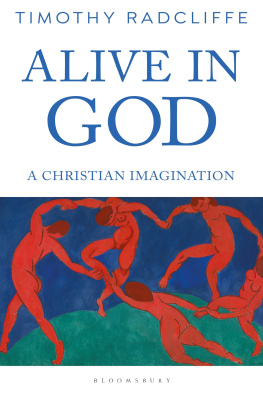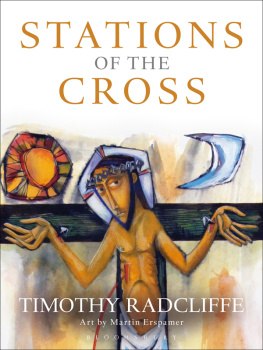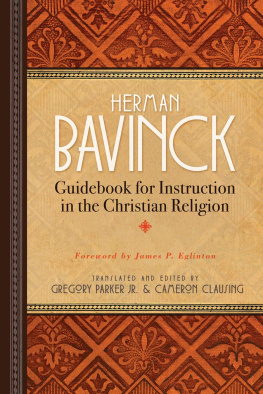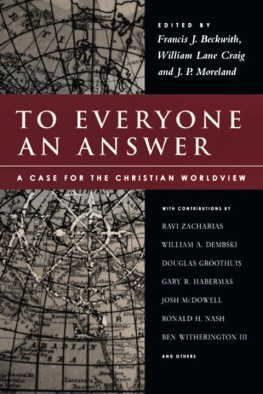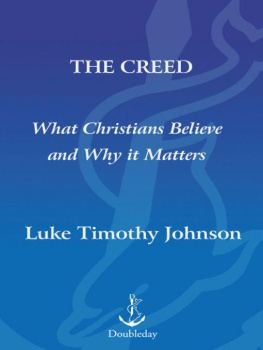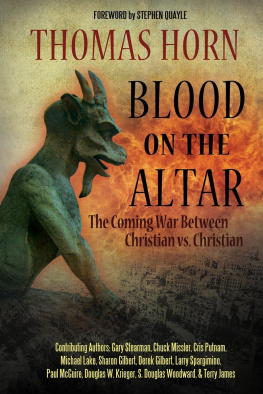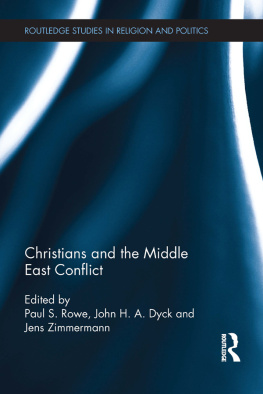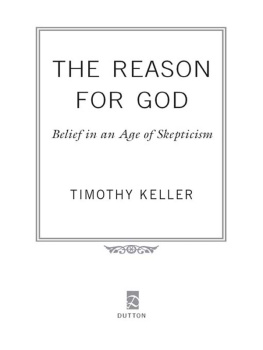For my mother,
whose life answers
the question

Copyright Timothy Radcliffe 2005
First published in Great Britain in 2005 by Bloomsbury Publishing Plc
50 Bedford Square, London WC1B 3DP
www.bloomsbury.com
This electronic edition published in January 2013 by Bloomsbury Publishing Plc
Bloomsbury Publishing, London, New Delhi, New York and Sydney
The moral right of the author has been asserted
All rights reserved
You may not copy, distribute, transmit, reproduce or otherwise make available this publication (or any part of it) in any form, or by any means (including without limitation electronic, digital, optical, mechanical, photocopying, printing, recording or otherwise), without the prior written permission of the publisher. Any person who does any unauthorised act in relation to this publication may be liable to criminal prosecution and civil claims for damages.
A CIP catalogue record of this book is available from the British Library
eISBN 978-1-4081-8343-4 (e-book)
Visit www.bloomsbury.com to find out more about our authors and their books
You will find extracts, author interviews, author events and you can sign up for newsletters to be the first to hear about our latest releases and special offers
Why be a Christian?, I was asked by a friend recently. I must admit that I was surprised by the question. I was brought up a Christian but had never been very interested in my faith until I found myself asking whether it was true or not. If it was true that humanity was destined to share Gods own unutterable happiness, then this must be the purpose of my life. If it was not true, then clearly I must leave the Church. So I replied to this friend of mine, Because it is true. But this did not satisfy him one bit. But whats the point of being a Christian? Whats the purpose of it?
We were clearly at cross-purposes. If Christianity is true, then it does not have a point other than to point to God who is the point of everything. If one asks about the point of doing anything, then ultimately, if one pushes the question far enough and if it is a serious enough matter, then one will come to the point of everything, the ultimate goal and purpose of our lives, and that is what religions are about. A religion that tries to market itself as useful for some other purpose because it helps you to live a stable life, because it gets rid of stress or makes you wealthy is shooting itself in the foot. If it has to justify itself by serving some other end, then it cannot be a religion that one could take seriously. The point of any religion is to point us to God who is the point of everything. That is why it makes no sense to ask whether belief in God is relevant, because God is the measure of all relevance.
But my friend was not deterred: What do you get out of it? What does it do for you? And I began to see what he was getting at. These truths to which we adhere must have some consequences in ones life. The truths of the law of gravity and that the earth is a globe have consequences. One can design planes that take off and if they set off in one direction they will eventually get back to where they started. If the truths of Christian teaching do not have any effects in ones life, any fruit, then what sort of truths would they be? If God is the point of everything, then being religious, being pointed towards God as ones ultimate goal, must show itself somehow in ones life.
So Christianity must surely make a difference, even if one is not a Christian so as to obtain the difference. If, for example, it were to be established that Christians were more calm and relaxed than other people, then one would not urge people to share our faith in order that they become less stressed. Become a Christian so as to sleep well at night. That would be to make religion merely a useful lifestyle accessory like going to the gym. It would be selling God as useful to me, like a bath essence or aromatherapy. But the fact that ones faith did, just as an example, make one more relaxed, or happy, or courageous of whatever, might suggest that the truth claims of Christianity are not trivial, and that they would be worth investigating. If shaping ones life towards God as ones ultimate destiny has consequences such as making one free, as I shall argue, then one would not say to people, Become a Christian because it will make you free. But if people see that Christians are free in an attractive and intriguing way, then they may become interested in knowing why, and ultimately in the God whom we worship.
Cardinal Suhard, Archbishop of Paris in the 1940s, wrote: To be a witness does not consist in engaging in propaganda nor even in stirring people up, but in being a living mystery. It means to live in such a way that ones life would make no sense if God did not exist. There should be something about Christians that puzzles people and makes them wonder what is at the heart of our lives.
In the second or third century, an unknown Christian wrote the Epistle to Diognetus which explores what is different about Christians:
For the Christians are distinguished from other people neither by country, nor language, nor the customs which they observe. For they neither inhabit cities of their own, nor employ a peculiar form of speech, nor lead a life which is marked out by any singularity. The course of conduct which they follow has not been devised by any speculation or deliberation of inquisitive people; nor do they, like some, proclaim themselves the advocates of any merely human doctrines. But, inhabiting Greek as well as barbarian cities, according as the lot of
So the claim was that there was something strikingly different about how Christians live that might make people pause and wonder. Tertullian wrote in the second century that people were astonished at how Christians loved each other. Is there anything astonishing about how we live?
There is an immense spiritual hunger among the young. The 1999 European Values Study showed that a growing number of young people define themselves as religious. They are often more interested in other religious traditions than Christianity.
As a Christian I believe that my faith is good news, the literal meaning of the word gospel. Why is it often not experienced as good news by the young, as wonderful and attractive? Why do the claims that we make for our faith often seem to be unconvincing and even boring? Could it be that it is because there is usually nothing strikingly different about our lives? Often there is nothing to puzzle and intrigue people, so that our lives would make no sense if God did not exist.
All the Christian Churches have in recent years being making a big push to spread the gospel. Certainly in the Catholic Church there has been a lot of talk about evangelization. Dioceses and parishes have drawn up ambitious plans to let people know about our faith. Usually these have had little effect. We talk about love, freedom, happiness, and so on, but unless our Churches are seen really to be places in which people are free and courageous, then why should anyone believe us? Jesus spoke with authority, not like the scribes and the Pharisees, and his authority was surely his manifest freedom and joy. His words made an impression because they were embedded in a life that was striking, reaching out to strangers, feasting with prostitutes, afraid of nobody. So in this book I wish to reflect about what difference faith might make to how we live.
Let me make it clear from the start that what may be strikingly different is not that Christians are better than other people. There is no evidence that we are. Jesus said, I came not to call the righteous but sinners (Mark 2.17), and this he continues to do. He ate and drank with the disreputable. The Church is a home for everyone, especially those whose lives are a mess. It is fitting that the first Christian to make it to Paradise was the thief who was crucified beside Jesus. According to an early Syriac poem, when he arrived at the gates of heaven, the angel who looked after such things tried not to let him in because he was not the sort of person who belonged there! Anyway, a community which founded its existence on the claim to moral superiority would not only be repulsive but would inevitably invite people to search for our failures and expose them with glee. If the Churches are so often attacked in the press, and our every sin given banner headlines, then this is because it is generally but wrongly assumed that the point of being a Christian is to be better than other people.
Next page

